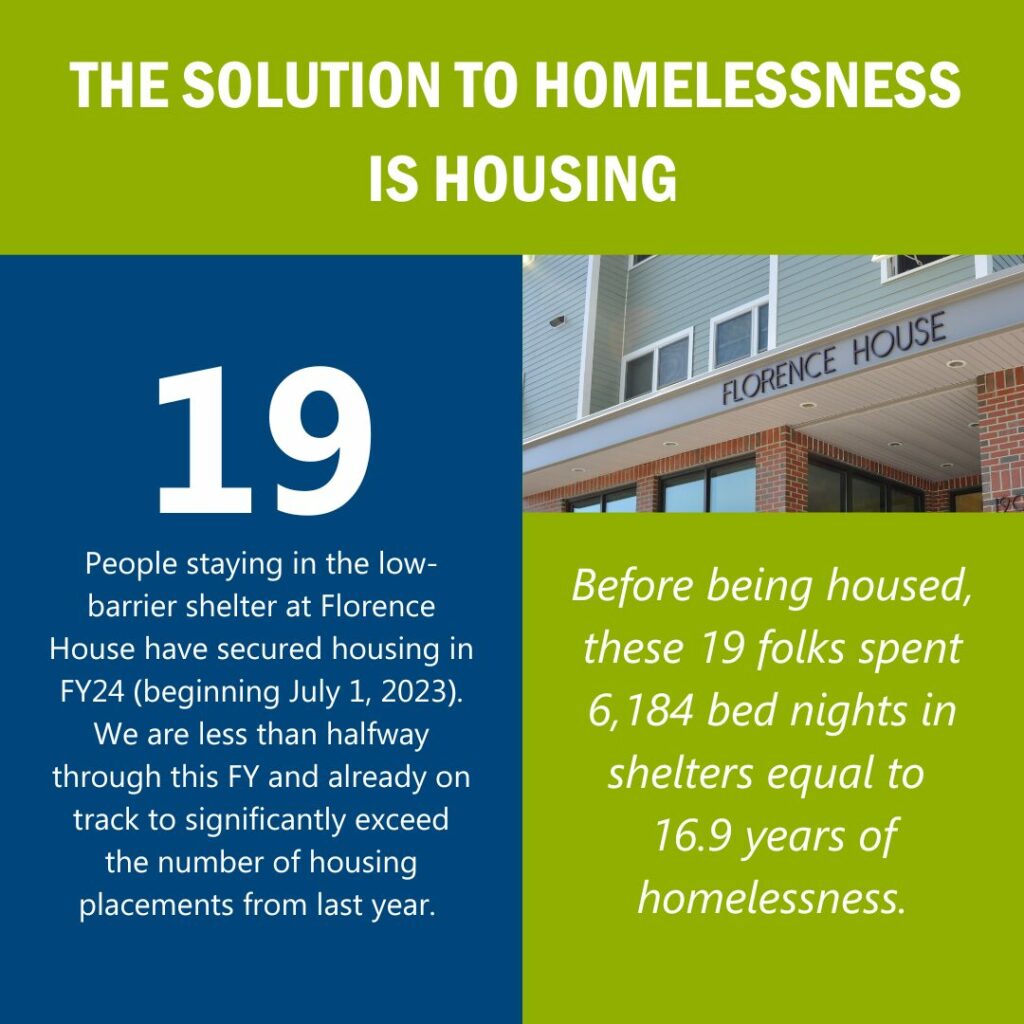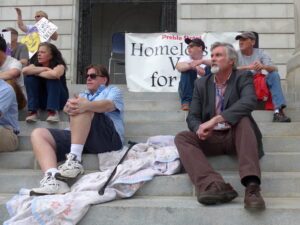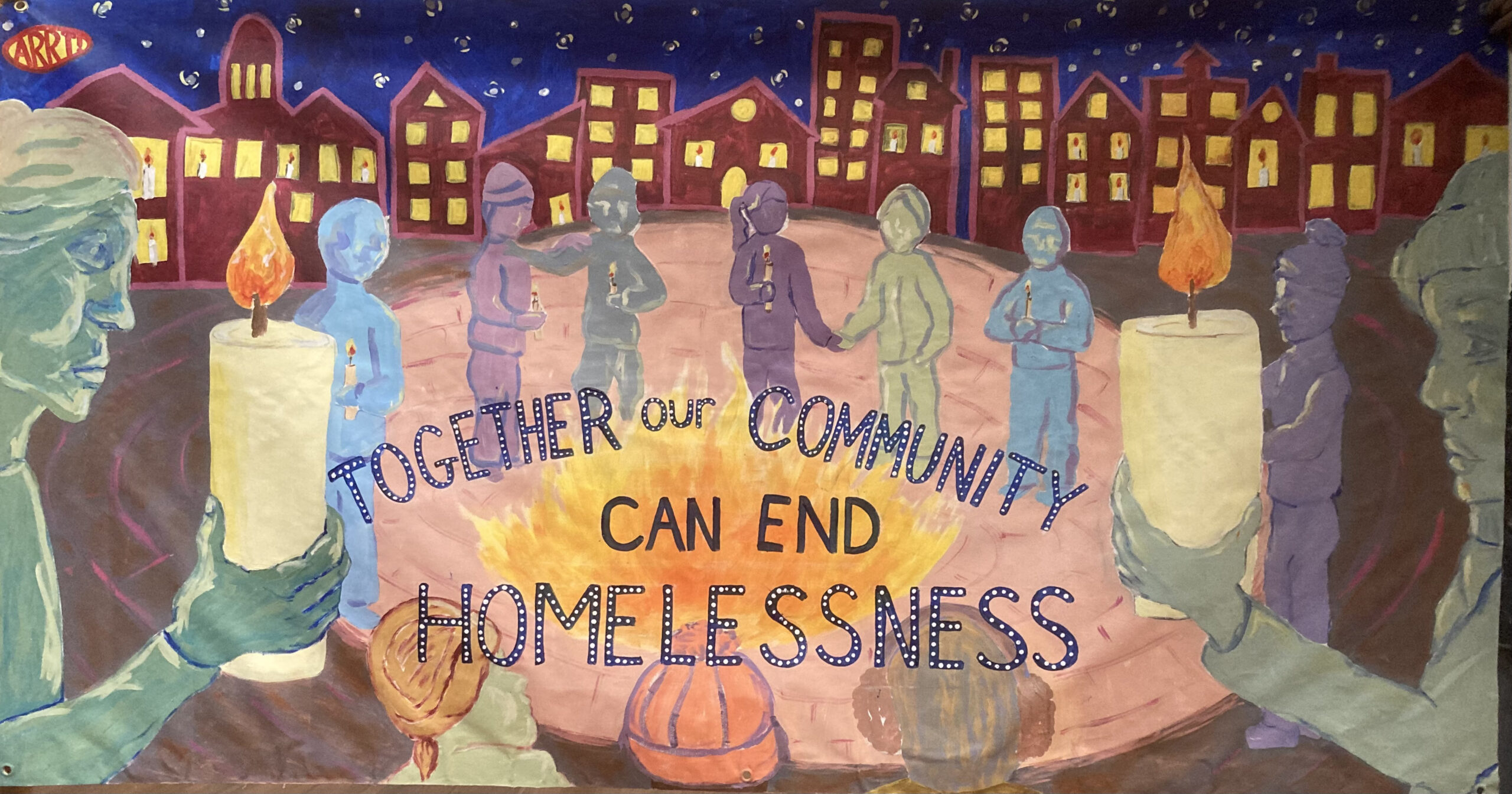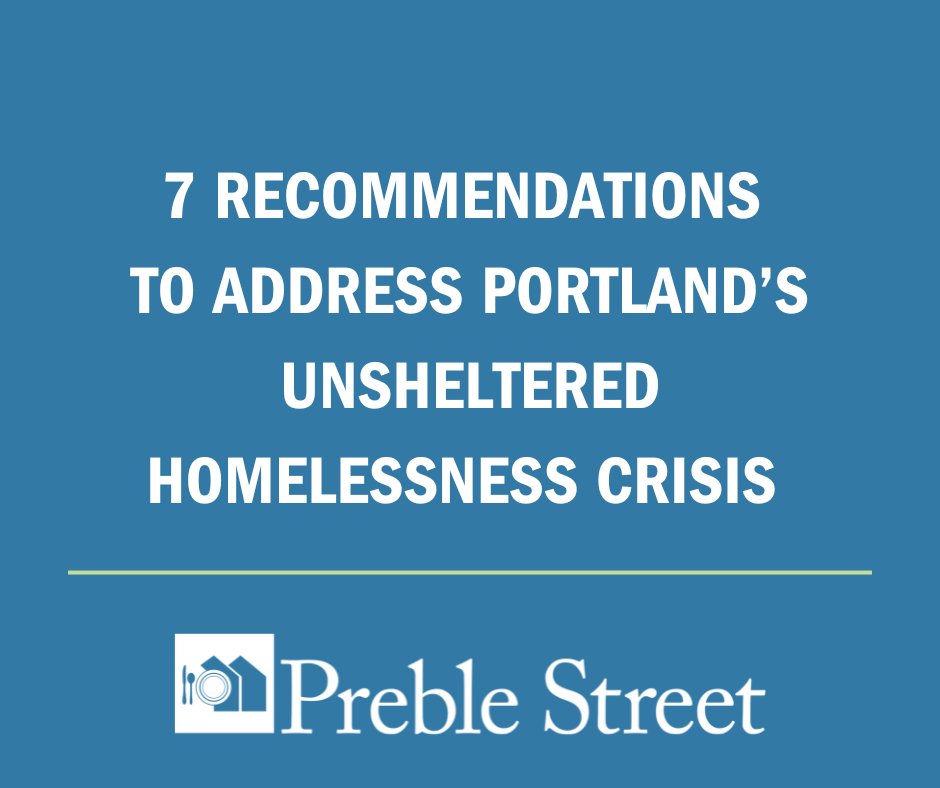Many communities across the United States are struggling with how to respond to the growing number of people who are experiencing unsheltered homelessness. Thanks to the pandemic, along with the lack of affordable and available housing and shelter, Maine is one of those places.

Maine, we can solve Maine’s unsheltered homelessness crisis.
In September 2023, Preble Street released a proposal with action steps in seven areas that collectively can address this public health, housing, and shelter crisis. The heart of this plan is to create an improved continuum of shelter and housing options in partnership with health care and the business community, with support from federal, state, municipal, and private efforts. While this plan was focused on Portland’s encampments, many of the recommendations could also be applied in other communities across Maine.
Adding new resources, including health care, case management, increased funding for shelters, and housing — all of which have been in short supply — will make a real impact and decrease the number of people in encampments. Maine has an opportunity right now to end homelessness. Together, we can work to implement solutions that work for all of us – from property and business owners to our vulnerable neighbors experiencing suffering and trauma right outside of our doors.
How is Preble Street addressing unsheltered homelessness
Meeting Basic Needs
The Street Outreach Collaborative works closely with other providers, with the City of Portland, and medical, and is often the first point of contact between people living outside and the larger homeless services system. Relationship building begins with a meal; clean socks; or gloves on a frigid
winter day. By starting with trust and unconditional positive regard, outreach caseworkers engage clients in a continuum of care that, when resources are available, can move people from the street to a low-barrier shelter to a home.
Providing Low-barrier Shelter
If we want people living in tents to access shelter, it is critical that the services provided are delivered with their needs and voices at the forefront. This was Preble Street’s intent when we opened Elena’s Way Wellness Shelter, Maine’s first and only shelter designed specifically for individuals experiencing
unsheltered homelessness and complex physical, behavioral health, or substance use disorders. We also apply a low-barrier approach to our shelters for youth and women. By increasing accessibility to our shelters and being flexible to people’s needs, we can move people from the streets to shelters and on into housing.
Expanding Site-based Housing First
Currently, there are three Site-based Housing First programs in Maine: Logan Place, Florence House, and Huston Commons. For these programs, Avesta Housing built, owns, and maintains the buildings; Preble Street provides 24-hour support services to ensure that people who are making the transition to
permanent independent housing will succeed. In November 2023, thanks to legislation signed into law this year by Governor Mills to create a sustainable vehicle to develop Site-based Housing First programs across Maine, Avesta and Preble Street announced plans to provide for a fourth Site-based Housing First permanent housing with on-site support services to chronically homeless people on the site of the former Oxford Street homeless shelter in Portland. We look forward to working with other partners to ensure that Site-based Housing First expands across the state.
Connecting People to Housing
The final piece of this puzzle is connecting people to permanent and safe housing, ensuring that they can maintain their housing, and preventing a return to homelessness. Whether serving youth experiencing homelessness, Veterans, trafficking survivors, or individuals or families who need a short-term, intensive housing-focused intervention, Preble Street staff work with people both before and after they are housed, and for as long as they need to ensure stability. Support might include assistance in accessing public benefits and community resources, budget counseling, referrals to employment specialists, connection to healthcare or substance use treatment, financial assistance, and more.

Numbers current as of December 12, 2023.
These are just some of the ways Preble Street is on the forefront of moving people out of homelessness and into shelter and housing. We hope you will join us in these efforts!
How can you help?
- Write to the Governor and your legislators to request increased funding and resources for low-barrier shelters on the front lines of the opioid crisis.
- Volunteer at Preble Street or other organizations in your local community that provide services to people experiencing poverty, hunger, or homelessness.
- Visit preblestreet.org to view a list of top needs of the unsheltered community or provide a monetary donation to support outreach, housing, and food programs.
Read more from the Winter 2023/24 Curbside

Preble Street Board Profile – Chip Leighton: Curbside Winter 2023/24
How did you first get involved with Preble Street? About 15 years ago, I started volunteering at the (then) Soup Kitchen with a group from my church, St. Alban’s Episcopal Church in Cape Elizabeth. I spent the first five years or so on the cleanup crew before I finally graduated to kitchen duties! What do

What can you do in one year? A look at Preble Street impacts in 2023: Curbside Winter 2023/24
Three Preble Street programs celebrated their first year of operation in 2023! Elena’s Way, a Preble Street Wellness Shelter Elena’s Way serves the needs of individuals experiencing unsheltered homelessness, individuals unable to access other shelter services, and individuals who are extremely vulnerable should they be unsheltered. At Elena’s Way, guests have control of their own

Letter from Swannie: Curbside Winter 2023/24
Photo: Mark Swann, on right, at a 2015 protest in front of Portland’s City Hall advocating for more overflow shelter capacity. Ensuring that there are enough shelter beds for all who need them continues to impact vulnerable Mainers. Right now, we are at a tipping point for homelessness in Maine. The number of people experiencing


